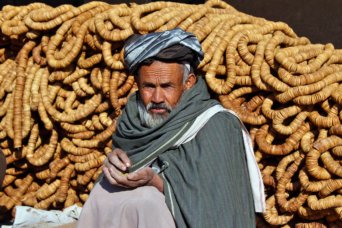- About
- Topics
- Story
- In-Depth
- Picks
- Opinion
- News
- Donate
- Signup for our newsletterOur Editors' Best Picks.Send
Read, Debate: Engage.
| topic: | Economic Fairness |
|---|---|
| located: | Afghanistan, Pakistan, India |
| editor: | Shadi Khan Saif |
During these crippling times of the coronavirus pandemic challenging sheer the survival of humans, even the fittest, the war-weary Afghans are subjected to a new form of ‘economic slavery’ by some of its neighbours.
This time of the year is the harvesting season for most of the crops in landlocked Afghanistan, which relies heavily on its agriculture. As per the country’s traders and farmers’ unions, hundreds of tons of fresh fruits and vegetables remain stranded at key crossing points with Pakistan for eventual exports, which means lifeline for them.
Only in southern Kandahar province, marred by the Taliban-led insurgency, some 200 trucks loaded with vegetables and fruits ready for export to Pakistan and then onward to the Indian markets remain stranded for weeks at the crossing point. The situation is exactly the same at a number of other crossing points.
This is an entirely deliberate tactic of inflicting losses upon not only the traders but eventually hundreds of thousands of poor farmers who work the whole year on the fields to finally reap some benefits. The rules of the trade, outlined in the Afghanistan-Pakistan Trade and Transit Agreement, does not allow such one-sided blockages what so ever.
Based on conservative estimates, the actual trade potential between the two countries is over $10 billion but because of such hurdles, the bilateral trade – documented and undocumented - is now no more than $3 billion.
Pakistan has for a long time only allowed Afghan exports to India through its northeastern Wagha border, but does not permit exports from India, meaning that export t0 Afghanistan must pass through its territory – which also remains a bone of contention in the region.
Considering the diverse geographical terrain, weather patterns and crops in Afghanistan and Pakistan, both countries can complement each other and particularly help address food shortages if cooperation, and not destruction.
Such a scenario eventually leads to undocumented trade and smuggling through which only the dark forces on both sides benefit, while the poor farmers remain locked in the vicious cycle of 'economic slavery'.
Image by chiplanay
